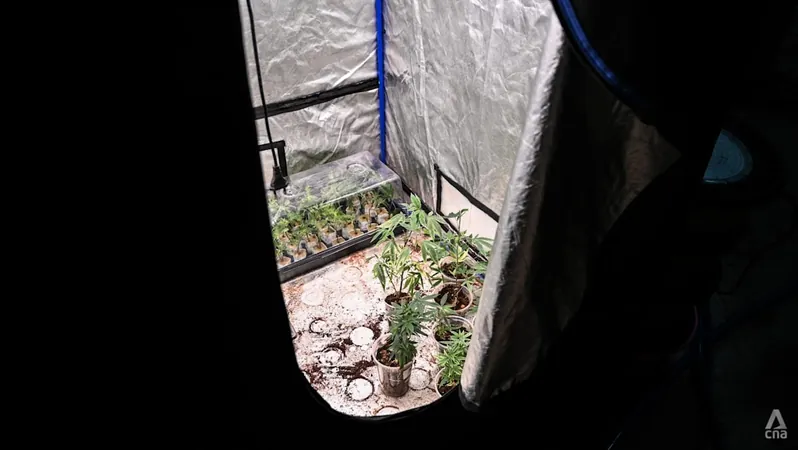
Thailand's Cannabis U-Turn: A Nation Divided Between Regret and Relief
2025-09-02
Author: Yu
A Sudden Shift in Cannabis Policy
BANGKOK – In a dramatic shift that has left many confused and anxious, Thailand has recently amended its cannabis laws, effective June 25. Now, cannabis can only be sold for medical purposes, causing a staggering 90% drop in sales across the country's 18,000 licensed stores as customers flock to underground channels.
The Burdensome New Regulations
Despite cannabis remaining legal, new hurdles have been placed in the way of buyers and suppliers. Customers are now required to present doctor's prescriptions for purchases, restricting access to the drug. From headaches to epilepsy and cancer pain, only those meeting specific medical criteria can obtain cannabis legally.
Stiff Penalties for Noncompliance
Businesses that fail to comply with these regulations risk a maximum one-year jail sentence and fines up to 20,000 baht (about $618). Moreover, individuals can only purchase 30 grams at a time, believed to cover a month's supply. Growers must also comply with strict government guidelines to ensure safe and quality cultivation.
Government's Efforts to Adapt
In a bid to support struggling businesses, the Ministry of Public Health has announced new measures. These include a central registration system for sellers and telemedicine access for new customers, aimed at simplifying the buying process.
Public Health Minister's Standpoint
Public Health Minister Somsak Thepsuthin has insisted that while regulations are tightening, the government is not shutting down cannabis shops. Instead, he emphasizes that the aim is to prioritize medical use over recreational, highlighting the potential social harm of unregulated consumption.
A Rise in Black Market Activity
As businesses feel the financial crunch from plummeting sales, many have been pushed into the shadows. Rattapon Sanrak, a leading figure in the cannabis industry, reports an alarming trend where 90 to 95% of shops are resorting to selling cannabis without proper documentation due to financial pressures. Customers, especially high-earning professionals, are increasingly reluctant to register, fearing stigma.
Tourists and the Fear Factor
Tourists, too, have stayed away from regulated outlets, opting instead for underground alternatives that offer lower prices and anonymity. One user shared that prices on the black market can be nearly half that of legal shops, making the underground market enticing despite potential risks.
A Divided Industry
While some in the industry call for stricter regulations to avoid contamination and ensure quality, others criticize the government for a lack of clear policy, which they believe is heavily influenced by political power plays. Advocates for cannabis rights argue that swift changes are throwing many honest business owners into chaos.
The Road Ahead: Uncertainty Looms
As political tension rises surrounding cannabis legislation and ongoing discussions about future leadership in Thailand, uncertainty lingers for the industry. With potential changes on the horizon and a possible criminalization of cannabis use looming, the situation remains delicate. Rattapon and his peers are even considering a class-action lawsuit against the government for abrupt policy shifts.
Final Thoughts: A Nation at a Crossroads
The conflicting sentiments in Thailand’s cannabis community reveal a nation grappling with cultural stigma, economic realities, and the pressing need for legal clarity. As stakeholders wait to see the outcome of political maneuvering, one thing is clear: the future of cannabis in Thailand hangs in a precarious balance.




 Brasil (PT)
Brasil (PT)
 Canada (EN)
Canada (EN)
 Chile (ES)
Chile (ES)
 Česko (CS)
Česko (CS)
 대한민국 (KO)
대한민국 (KO)
 España (ES)
España (ES)
 France (FR)
France (FR)
 Hong Kong (EN)
Hong Kong (EN)
 Italia (IT)
Italia (IT)
 日本 (JA)
日本 (JA)
 Magyarország (HU)
Magyarország (HU)
 Norge (NO)
Norge (NO)
 Polska (PL)
Polska (PL)
 Schweiz (DE)
Schweiz (DE)
 Singapore (EN)
Singapore (EN)
 Sverige (SV)
Sverige (SV)
 Suomi (FI)
Suomi (FI)
 Türkiye (TR)
Türkiye (TR)
 الإمارات العربية المتحدة (AR)
الإمارات العربية المتحدة (AR)